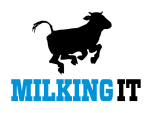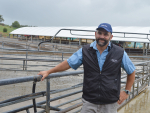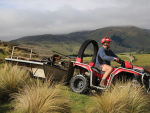OPINION: I learnt about what economics means for households through juggling my first mortgage and the childcare costs of our four kids and by being invited into the lives of New Zealanders from all walks of life who have had the generosity to share their stories and hopes with me.
I learnt what matters for our exporters by talking with the team at a factory in Colombo turning New Zealand milk into branded consumer products; by watching closely as my senior managers negotiated deals with global food producers in Shanghai and by listenig to farmers while gazing out over muddy paddocks here in the Waikato.
The cost of living is higher than it's ever been. Inflation has now been out of the Reserve Bank target range for 21 months and isn't forecast to come back dow to target for another year.
With the thief of inflation comes rising interest rates. Not in the history of the Official Cash Rate have New Zealanders experienced such a fast and dramatic lift in interest rates as has occurred since October 2021. The resut is that many homeowners will be left scrambling this year when their mortgage switches from a rate with a 2 or 3 in front of it to something with a 6 in front of it.
The average hourly wage may be nominally higher, but for many people it hasn't kept up with rising prices, meaning each fortnight's pay gets stretched thinner than the last.
Worker shortages are persisting and slowing activity down - from the wait for your coffee, to the building of new roads to the filling of exporters' order books.
Inflation and fiscal drag have pushed New Zealand workers into higher tax brackets, meaning typical income-earners are paying more tax.
Government spending has crept up to 35 per cent of GDP, higher than it's been in 17 years, yet it's difficult to find solid evidence that the performance of key public services have actually improved.
New Zealand must fix these problems and simultaneously rise to global challenges - decarbonising our economy, adapting to the more frequent severe, weather events climate change is bringing and maintaining a secure footing in a world of less stable foreign affairs, of deglobalisation and growing protectionism.
The growing cost of living is the number one economic issue for New Zealand today. People are really hurting. Debt arrears are up, queues for food banks are up, anxiety about household finances is rising.
National maintains the orthodox view that the Reserve Bank must play a leading role. We will return the bank to a single mandate of delivering price stability, with a 1-3 per cent inflation target band.
We will commission an independent review of the bank's performance over the period 2020-2022, when extraordinary monetary policy decisions were taken, including a volume of quantitative easing that, proportionate to the size of our economy, put us amongst the top handful of Covid money-printers in the world.
Second, we will unblock major supply-side constraints to productive growth, starting with worker shortages. We will cut through the hold-ups in the immigration system so businesses and hospitals can get the workers they need.
Third, we will stop the tidal wave of new costs and regulations that have added more price pressure to everything from food to rent.
Fourth, National will restore discipline to Government spending. This will help ease the pressure on inflation and interest rates that has been exacerbated by loose fiscal policy; it will increase the focus on results for money spent; and it will allow our government to reduce the tax burden on New Zealanders.
I remain fundamentally optimistic about New Zealand's prospects. It's because the strengths we have as an economy are almost exactly the strengths countries will need to succeed in the changing world of coming decades.
In a world of growing food insecurity, we feed 40 million people and have huge opportunity to get more value for the sustainable, carbon-efficient, nutritious food we produce.
In a world desperately seeking to transition from fossil fuels to renewable energy we already depend on largely renewable energy and, with the right approach to consenting, we have the ability to produce much more abundant renewable energy for the future.
We remain a country of the best people in the world; hard-working, community-minded, innovative and entrepreneurial. New Zealanders are this economy's magic ingredient.











